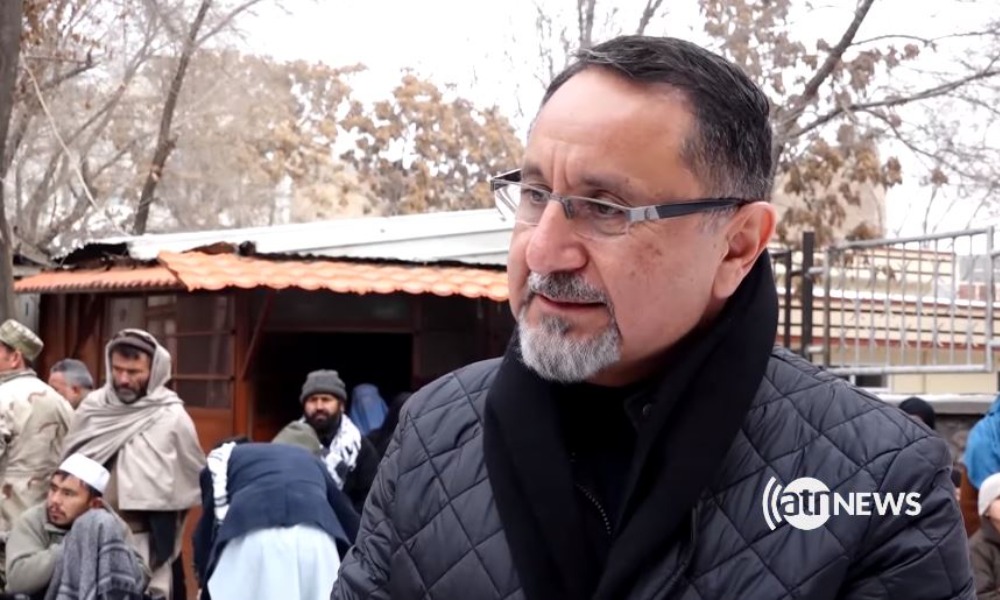Business
‘Digital Silk Road’ on track as Afghanistan and Turkmenistan connect

Thursday marked another milestone in Afghanistan’s modern history when President Ashraf Ghani inaugurated the new fiber optic connection between Turkmenistan and the commercial port of Aqina in Afghanistan’s Faryab province.
Within four months of having signed the memorandum of understanding with government the Afghan Wireless Communication Company (AWCC) had successfully completed the task of connecting the two neighboring countries.
In a virtual address at the launch, Dr Ehsan Bayat, the founder and chairman of AWCC, said he was “delighted” to celebrate the company’s success in connecting Afghanistan with its friends in Turkmenistan – especially given the past year that has involved unprecedented challenges due to the coronavirus pandemic, which also impacted people’s ability to connect with each other across the globe.
“When Afghan Wireless embarked on the journey to build Afghanistan’s largest nationwide fiber network, we did so with the goal of realizing President Ghani’s vision to transform the country into a hub of digital data connectivity for Central Asia.
“Today marks an important milestone in the building of a digital silk road across the region with Afghanistan at its center; a road that will connect millions of Afghans to the digital economy.
He said the latest optical fiber connection, between Afghanistan and Turkmenistan, is the country’s fifth and sixth international border connections. Others include Tajikistan, Uzbekistan, and Pakistan.
“From Mazar to Jalalabad, and from Kabul to Kandahar to Kunduz, communities across the country are benefiting from high-speed connectivity. And now our connection to Turkmenistan through Torghundi and Aqina will enable Herat and western cities to become Afghanistan’s next major bridge for digital transformation,” he said.
However, Bayat stated that the impact of AWCC’s project should not be measured in kilometers of fiber laid, or megabytes of data transmitted, or even money invested but instead, it should be measured by the industries revitalized, the local businesses boosted, the jobs created, the pace of economic development and the enhancement to critical services in health, education, commerce and finance.
“This project could not be delivered without Afghanistan and Turkmenistan working together.
“Afghan Wireless’ optical fiber connection between the two countries that we are celebrating today is a powerful testament that when we work hand in hand with our neighbors, not only do we strengthen our countries individually, but we also strengthen our region together,” he said.
The Turkmenistan to Aqina cable has the capacity to transfer 2,500 megabits of the Internet and can therefore provide high quality and cheap Internet to Faryab province.
According to the Ministry of Communications and Information Technology, a fiber-optic network is the result of the rapid development of telecommunications and information technology, which has become an integral part of modern life.
The ministry states that along with the progression of technology and innovation, the shape and quality of tools have also changed to a great extent.
At the beginning of the invention of the telephone, copper cables were used to transmit information and sound, but today, with the advancement of technology and increasing human needs, these cables have been replaced by a new generation of signal conductors or fiber optics.
Because of the need for fast and cheap digital connectivity in the country, Government has already connected a total of 25 provinces in the country with the national fiber-optic network.
Business
Pakistan’s kinno exports falter as tensions with Afghanistan continue

Pakistan’s kinno exports remain far below potential as regional tensions, high freight costs and weak government support continue to choke the citrus trade.
Despite being a leading global citrus producer, Pakistan is expected to export just 400,000–450,000 tonnes of kinno in the 2025–26 season, compared with an estimated capacity of 700,000–800,000 tonnes.
Exports in 2024–25 stood at around 350,000–400,000 tonnes, mainly to Russia, the UAE, Saudi Arabia, Afghanistan, Indonesia and Central Asia. While better fruit quality this season has raised hopes, persistent crossing disruptions—especially with Afghanistan—and transport bottlenecks have offset gains.
Growers say prices have collapsed sharply, forcing panic sales. Rates for large kinno have fallen from over Rs120 per kg early in the season to as low as Rs75, while smaller fruit is selling for Rs35–40 per kg amid weak demand.
Industry leaders warn the crisis is crippling processing units and jobs. More than 100 factories reportedly failed to open this season, with dozens more shutting down as exports stall. Cold storages in Sargodha are nearly full, putting fruit worth millions of dollars at risk of spoilage, while growers fear losses of up to Rs10 billion.
Exporters are urging the government to urgently resolve issues, subsidise logistics, and help access alternative markets, warning that prolonged inaction could devastate farmers, workers and the wider economy.
Business
Pezeshkian pledges to facilitate Iran-Afghanistan trade

Iranian President Masoud Pezeshkian has said that Tehran will facilitate trade and economic exchanges with Afghanistan, including easing procedures at customs and local marketplaces.
He made the remarks during a televised interview following his visit to South Khorasan province, which shares a border with Afghanistan.
Pezeshkian, in a separate event addressing local business leaders, highlighted the province’s strategic advantages, citing its rich mineral resources, proximity to neighboring countries such as Afghanistan and Pakistan, and access to the ocean via the Chabahar port. He described the region as “a golden opportunity not found everywhere,” emphasizing its potential for economic growth and cross-border commerce.
Business
Afghanistan-Kazakhstan banking ties discussed in Kabul meeting
-

 Latest News2 days ago
Latest News2 days agoAfghanistan signs 30-year deal for marble mining in Daikundi
-

 Latest News4 days ago
Latest News4 days agoAfghan border forces prevent illegal entry of hundreds into Iran
-

 Latest News3 days ago
Latest News3 days agoPakistan summons Afghan diplomat over deadly attack in North Waziristan
-

 Latest News3 days ago
Latest News3 days agoAfghan health minister calls for medical cooperation between Kabul and New Delhi
-

 Latest News4 days ago
Latest News4 days agoJapan allocates nearly $20 million in humanitarian aid for Afghanistan
-

 Latest News3 days ago
Latest News3 days agoKarzai urges reopening of girls’ schools and universities for Afghanistan’s bright future
-

 Health5 days ago
Health5 days agoAfghanistan seeks India’s support in standardizing traditional medicine
-

 Business5 days ago
Business5 days agoAfghanistan-Kazakhstan banking ties discussed in Kabul meeting

























